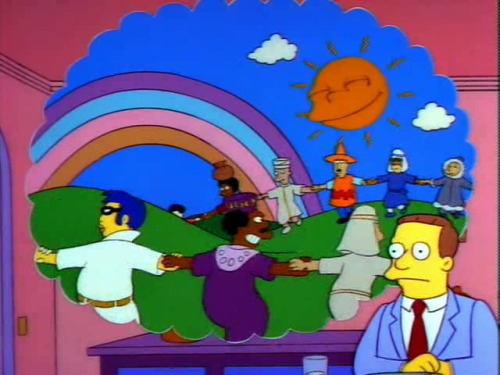On December 22, 1973, a few weeks after Gerald Fords swearing-in as Vice President, Richard Nixon held his annual ceremonial meeting with the Joint Chiefs of Staff. One member of the Joint Chiefs, a four-star officer, recalled in a recent interview that the President's performance was bizarre and alarming. "He kept on referring to the fact that he may be the last hope, the eastern elite was out to get him. He kept saying, 'This is our last and best hope. The last chance to resist the fascists [of the left].' His words brought me straight up out of my chair. I felt the President, without the words having been said, was trying to sound us out to see if we would support him in some extra-constitutional action. He was trying to find out whether in a crunch there was support to keep him in power . . . ." The senior officer decided after the meeting, he recalled, that the other members of the Joint Chiefs did not seem to share his fears. He made it a point to discuss the meeting with James Schlesinger, the Rand Corporation economist and defense analyst, who had been named secretary of defense by Nixon in May of 1973, in the first Watergate-inspired Cabinet shake-up. Schlesinger had also been upset by Nixon's language, but he was noncommittal.
...
Laitin broached some of his fears: Was it possible for the President of the United States to authorize the use of nuclear weapons without his secretary of defense knowing it? What if Nixon, ordered by the Supreme Court to leave office, refused to leave and called for the military to surround the Washington area? Who was in charge then? Whose orders would be obeyed in a crisis? "If I were in your job," Laitin recalls telling Schlesinger, "I would want to know the location of the combat troops nearest to downtown Washington and the chain of command." Schlesinger said only, "Nice talking to you," and hung up.
...
Sometime in late July of 1974, Schlesinger called in Air Force General George S. Brown, the newly appointed chairman of the Joint Chiefs of Staff.
Brown was known as an officer who was far more comfortable behind the stick of an airplane than in an office; he never seemed to master high-level politics, with its subtle language and indirection. Bearing that in mind, and aware that Brown had taken an oath of office that made him responsible to Nixon as Commander-in-Chief, Schlesinger trod delicately during their talk. His goal was to express his concerns about the White House and somehow to get Brown to reach the same conclusion that he himself had already reached. In essence, Schlesinger asked Brown for a commitment that neither he nor any of the other chiefs would respond to an order from the White House calling for the use of military force without immediately informing Schlesinger. Brown dutifully relayed Schlesinger's message to the other members of the Joint Chiefs of Staff at a meeting a few hours later. He began the session, one of the joint chiefs recalls, by announcing, "I've just had the strangest conversation with the Secretary of Defense." Schlesinger had urged him not to "do anything to disturb the equilibrium of the Republic, and to make sure we're in accord." He had said, "Don't take any emergency-type action without consulting me." Brown was troubled by Schlesinger's remarks, and so was everyone else at the meeting. "We were confused, and George had to be confused," the chief says. 'We sat around looking at our fingernails; we didn't want to look at each other. It was a complete shock to us. I don't think any of us ever considered taking any action. We didn't know whether to be affronted or flattered at the thought." The chief recalls that one of his colleagues commented that Schlesinger must have been "thinking of something out of Seven Days in May." If there was any consensus, the chief says, it was that "Schlesinger was coming unglued."
...
The notion that Nixon could at any time resort to extraordinary steps to preserve his presidency was far more widespread in the government than the public perceived in the early days of Watergate or perceives today. One of the original Watergate prosecutors recalled in a recent interview the immediate fear, once the full implication of John Dean's allegations in the spring of 1973 became known, that "the government could topple." When the case against Richard Nixon was initially outlined that April to Henry E. Petersen, head of the Justice Department's Criminal Division, the prosecutor says, Petersen responded by exclaiming, "The government's going to fall. And then what's going to happen?" The concern was that Nixon would not comply with the judicial process: instead of accepting subpoenas for his internal records, he would defy the courts and any contempt summons. "Who ever heard of a President subjecting himself to a court?" the prosecutor recalls asking himself. "What if Nixon goes on TVand openly defies the court? Who is the public going to support? Thousands of telegrams come in his support, and Nixon calls in the Joint Chiefs of Staff. Then what is Congress going to do?"
"I'll tell you what," the prosecutor says. "They'll run for cover. One third of the country still supports him, and we're on the verge of civil insurrection. If he told the Joint Chiefs, 'I want the troops out and I want to dissolve Congress,' they would have done it."
It was to Nixon's credit, the prosecutor insists, that Nixon chose to accept service of a judicial subpoena and not to jail the marshal delivering it. "You've got to say this for himhe had respect for the government, because he stepped out. If he were a Hitler or a Stalin, he'd have gone all the way, brought the house down. And that's what Jaworski was afraid of and that's what we were afraid of."







